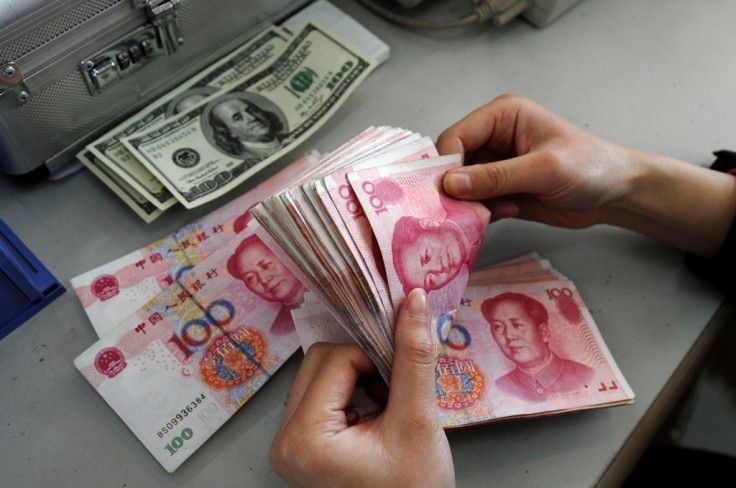China's Dollar Trap: Foreign Exchange Reserves Hit $3.8tn

China's foreign exchange holdings jumped to $3.82 trillion (£2.33tn, €2.81) at the end of 2013, reflecting a steady rise in reserves throughout the year, the People's Bank of China has said, but analysts are wondering if the costs of forex accumulation wouldn't outweigh the returns.
Beijing accumulated the biggest foreign exchange reserves in the world over the last couple of decades, by running huge trade surpluses and keeping the yuan's value low. Beijing's forex reserves had stood at a mere $100bn in 1996, but the country's emergence as the world's biggest exporter helped it overtake Japan as the biggest holder of foreign exchange in ten years.
In 2013, the forex reserves saw a jump of $510bn, compared with $130 billion net increase in the previous year.
The big jump last year came despite the cooling in exports and the changes in monetary policy that saw a gradual appreciation in yuan's value, as China appeared buying peace with the West, which had accused Beijing of currency manipulation.
Barclays Capital said in a research note the massive rise in China's foreign reserve came on the back of capital inflows amid large interest rate differentials and a wide trade surplus.
"On 7 January, Yi Gang, a PBoC deputy governor and director of China's State Administration of Foreign Exchange, reiterated his view in "Qiushi" (a local publication) that the costs of reserve accumulation could now outweigh the gains. He suggested allowing greater flows of capital into and out of China in 2014," the researchers said.
Hot Money Inflows
Analysts also said rising interest rates in China and the appreciation in yuan might have created hot money inflows into the country, helping a surge in forex reserves.
"We reckon hot money inflow pressures could be still strong at the moment," Bank of America Merrill Lynch said in a research note.
China's forex reserves have always been much higher than the unofficial bottom-line limits of foreign reserves and the central bank has been sitting uneasy on the cash pile.
The conventional notion is that a country should keep enough reserves to meet at least three months of imports, while also maintaining a healthy ratio of 10% of gross domestic product and 30% of gross national debt.
Historically, China's foreign exchange reserves have been far higher than this. Ding Zhijie, a professor at the University of International Business and Economics, explained to China Daily in 2011 how the country's reserves were far higher than the bottom line projections.
"China's foreign exchange reserves amounted to nearly 2.9 trillion U.S. dollars by the end of last year, representing 22.5 months of imports, more than 48 percent of GDP and 520 percent national debt," said Ding.
The latest data released on Wednesday, which puts the reserves at close to $4trillion, suggests Chinese policymakers will have a tough time managing the reserves, which the People's Bank of China once called "excessive", and diversifying the country's foreign holdings.
Analysts have said the options for China are limited. China ran up the reserves during its quest for unbridled economic growth and massive job creation for its billion-plus population. As a result the country became what was called the "world's factory" and decades of stellar export growth that followed resulted in spiralling forex reserves.
Muted Growth in Domestic Consumption
The policymakers have realised that the forex reserves are not exactly 'wealth," as opposed to the popular notion. The right management of the reserves, most of which is invested in low-yielding US securities, is important for building up an economy based on strong domestic demand.
Obviously the biggest cost of building up a massive foreign exchange reserve was the muted growth in domestic consumption and laggard progress in long-term export competitiveness.
China historically resisted shifting to free-floating exchange rate system, mainly because it wanted to retain its edge in exports and thereby create the great numbers of jobs it needed to put its social-political fabric together.
The fierce exports drive resulted in huge trade surpluses, which in normal course lead to currency appreciation. But Beijing put a tight lid on yuan appreciation, and resorted to buying US dollars to control the renminbi exchange rate.
"China could legally sell off its holdings of United States government debt at any time ... The US is not disallowing such action. Realistically though, it is almost impossible for China to do so. Despite much talk about diversifying reserves, China really is in a "dollar trap," James Parker wrote in The Diplomat in September 2012.
If China pulls funds out of the US government debt and brings them back to the country it will drive up inflation and damage the crucial export sector, he said.
Moreover, China cannot really offload US bonds in huge tranches without driving its value down, which in turn results in the immediate erosion in the value of its assets. Though China does not offer breakups of its foreign currency denominated assets, it is estimated that up to 75% of its foreign reserves are held in US dollar denominated assets.
Paul Krugman wrote in an NY Times op-ed in 2009. "Was there a deep strategy behind this vast accumulation of low-yielding assets? Probably not. China acquired its $2 trillion stash — turning the People's Republic into the T-bills Republic — the same way Britain acquired its empire: in a fit of
absence of mind."
© Copyright IBTimes 2025. All rights reserved.






















